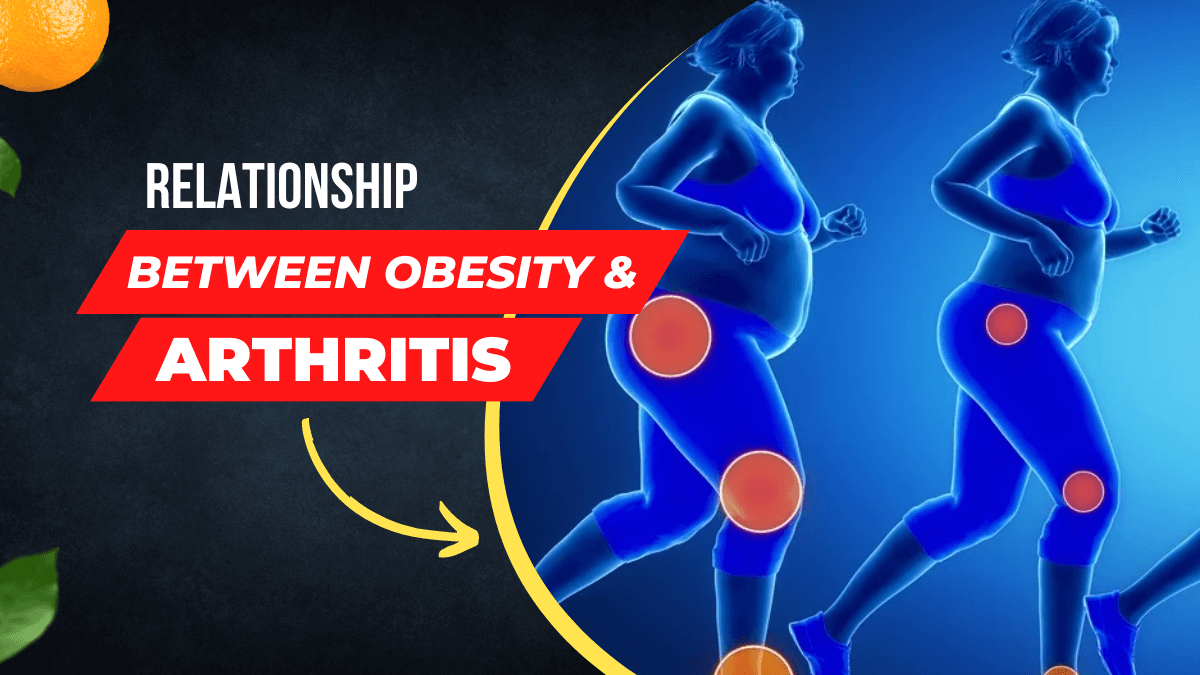Relationship between Obesity & Arthritis

Is Sugar toxic?
March 11, 2023
Smoking, Obesity & Arthritis Pain
March 25, 2023Relationship between Obesity & Arthritis
Obesity is when a person has excessive fats in the body, is overweight, and is predisposed to many health-related problems. If not controlled, it can cause conditions that may be life-threatening.
Obesity can increase the risk of developing certain forms of arthritis. However, shedding even the slightest body weight can help manage mental and physical health.
Being overweight complicates ongoing diseases and predisposes us to other medical health problems. For example, excess weight can worsen arthritis symptoms and deteriorate the condition of joints or complicated body systems.
Why Obesity Raises the Risk of Arthritis
Obesity and Osteoarthritis
Research suggests that a rise in obesity among the population has caused a sharp increase in cases of osteoarthritis. Osteoarthritis is an autoimmune condition that affects the bones and joints. The relationship between osteoarthritis and obesity is apparent. The higher the weight, or fat content, the more pressure falls on the joints. In osteoarthritis, the cartilage cushioning the joint wears off.
Fats contribute to the worsening of osteoarthritis symptoms and are likely to cause the need for joint replacement procedures. They add to complications and also lead to poor outcomes of surgery. They also fasten disease progression in people with arthritis.
Obesity and Rheumatoid Arthritis
Fat cells produce and release inflammatory enzymes that elevate inflammation. Excess weight creates pressure on the joints, thereby damaging them. Furthermore, it causes misalignment of joints due to the pressure and compromises function.
Obesity has long-term side effects on joint health. The pressure increases even more when you pick up something or move from one place or another. In addition, the extra fats provoke inflammation within the body, making people more vulnerable to developing arthritis and hastening cartilage destruction.
Obesity and Psoriatic Arthritis
Research suggests there exists an association between obesity and psoriatic arthritis. It is inflammatory arthritis that manifests in some people with psoriasis. Psoriasis is an autoimmune condition that leads to red, scaly patches of skin. A population-based study states that the risk of developing psoriatic arthritis is high in patients with higher BMI or body mass index.
Obesity and Gout
Gout is the kind of arthritis that is characterized by intense episodes of painful swelling and tenderness in joints. The feet, specifically the big toe, are most commonly affected. This condition occurs when the levels of uric acid are elevated in the body, causing the formation of uric acid crystals. These crystals accumulate within the joint and trigger painful gout attacks.
Under usual circumstances, uric acid dissolves in the blood and is eliminated through the kidneys. However, in overweight people, more uric acid is produced, which makes it difficult for the kidneys to process.
How Obesity Makes Arthritis Management Worse
Some factors of obesity that worsen the management of arthritis are:
Having a higher weight adds excessive pressure on the joints. The extra weight contributes to disease progression if the joints are already compromised.
More weight means more inflammation. Arthritis, being an inflammatory condition, has factors that add to it and aggravate a patient's status.
Obesity impacts the action of arthritis drugs.
How Weight Loss Improves Arthritis
Reduced joint pain and inflammation
Better joint function
Lower risk of comorbid conditions
More energy
Sounder sleep
Controlling Weight and Arthritis
The manifestation of arthritis symptoms can be controlled with medicines, exercise, diet, and lifestyle changes. Each ingredient you eat affects controlling the inflammatory process in the body. Hence, carefully adding anti-inflammatory and antioxidant-rich food items to the diet can help reduce flare-ups. Research suggests that some foods contain anti-inflammatory properties that control levels of enzymes that cause inflammation.
Even exercise can be highly favorable for people with arthritis. This is because it helps keep you fit, lose excess fat, relieve excessive pressure on the joints, and keep you active. In addition, it prevents any complications associated with disease progression.
Exercise moves the joints and promotes the movement of accumulated inflammatory fluid within the joints. Moreover, it supports healing since more blood circulation occurs with an active lifestyle. Thus, energetic people with RA have reduced joint pain, swelling, and increased range of motion. Moreover, it keeps the mood in excellent shape and prevents emotional breakdowns.
However, seeking professional advice before these exercises is essential since overworking can worsen your situation.







